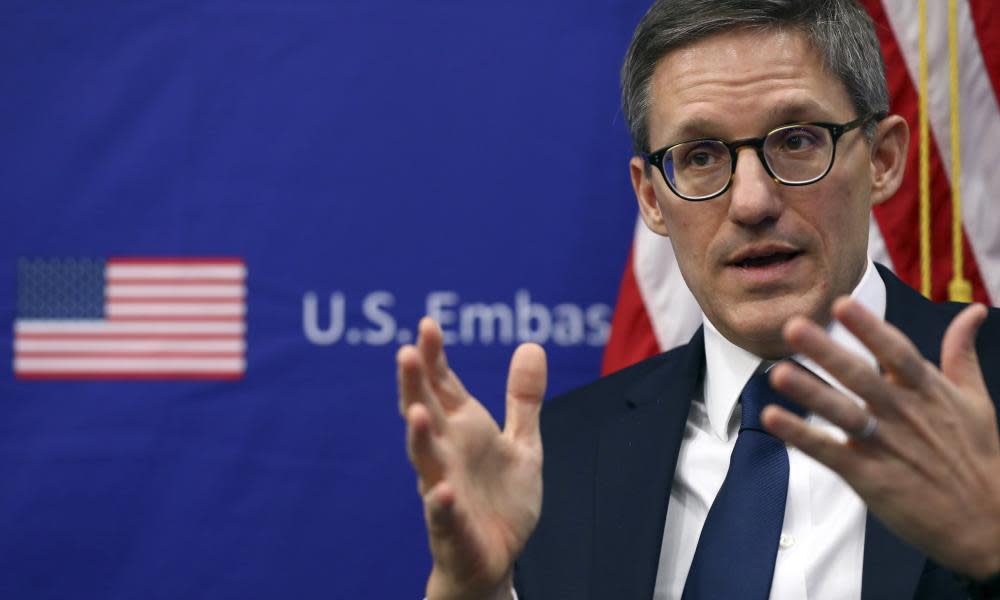US and UK trying to fend off Russian invasion by making intelligence public

- Oops!Something went wrong.Please try again later.
- Oops!Something went wrong.Please try again later.
The US and the UK have sought to fend off a feared Russian invasion of Ukraine in part by going public with an unusual amount of intelligence, hoping to rob Vladimir Putin of the element of surprise.
There have been regular briefings in Washington and London – sometimes from national security officials who do not often talk to the press – going into detail about potential Russian military tactics, regime change plots, and “false flag” operations Moscow is allegedly planning to provide a pretext for invasion.
Derek Chollet, the state department counselor, said on Wednesday that the US and its allies wanted to warn of Russia possibly carrying out such operations in Ukraine “in order to hinder their ability to do so”.
“We are trying to be as forthcoming as possible, to say that’s their play and what could be coming,” Chollet said.
In doing so, the US and UK are trying to beat Russia at what has largely been Moscow’s game in recent years – or at least to provide better opposition.
“I think it’s the west getting a little more savvy on using intelligence in an actionable way,” John Sipher, a veteran of the CIA’s clandestine service, said. “It’s what we used to call – when the Russians did it – information warfare, and it’s something we’ve never got very good at.
Related: Russians ridicule western media on ‘day of no invasion’
“What’s interesting is this information isn’t meant for Americans or British citizens. It’s meant for one consumer: Vladimir Putin,” Sipher said. “He’s the one who knows whether it’s true or not. So if we put out intelligence that the Russians thought was secret, and Putin knows it’s true, he’s got to decide how it has consequences for what he was trying to do, and how it’s affecting his strategy.”
US and British officials have repeatedly said the ultimate decision to attack or not will be Putin’s alone, and even he may be leaving it to the last moment to make up his mind. If the decision is indeed on a knife-edge, the thinking goes, any small factor, such as taking away the surprise element and the satisfaction of catching the west off guard, could make a difference.
“We’re in an information war with the Russians and we have been for some time,” Angela Stent, director of Georgetown University’s center for Eurasian, Russian and east European studies, said. “I think the Russians have been taken by surprise. I think they didn’t realise how much the US and Britain knew about this, but also that they would put it out there publicly. So I think it’s possible that this has had the impact of making Putin maybe rethink some things he might do.”
On Wednesday, the US State Department claimed Russia was attempting to create a “pretext” for invading Ukraine with unsupported claims of “genocide” and mass graves in Ukraine’s eastern Donbas region.
Russian media published articles and photographs this week of purported secret mass graves in the region and on Tuesday, Putin claimed that Kyiv was committing “genocide” there.
State department spokesman Ned Price claimed that Moscow was making the claims as an excuse for invading Ukraine. “There is no basis of truth to any of these allegations,” Price said.
Fiona Hill, a former senior director for European and Russian affairs in the national security council, and co-author of a Putin biography, contrasted the current approach to the western response to past Russian operations, such as the attacks in Britain on the defectors Alexander Litvinenko and Sergei Skripal.
“We never really kind of revealed what we knew about what they were up to, and then they were able as a result to take advantage of all the grey zones and the uncertainty and spin their own narratives,” Hill said.
Going public also serves a domestic political purpose, especially for a US administration that has been widely criticised for failing to predict the collapse of the Afghan government and Taliban takeover last year. If there is a Russian attack, no one will be able to say the Biden White House was taken unawares.
The flip side of that is if Putin does not attack, US and British intelligence will be accused of crying wolf and getting it wrong once more, especially as neither has shown evidence for their assertions. The Kremlin is already taunting the western media for reporting US and allied claims of imminent war.
Another downside is that the deliberate alarmism is publicly alienating the government in Kyiv, which argues it is seeding panic among Ukrainian citizens and would-be foreign investors, insurers or trade partners.
Related: Don’t panic: why Ukraine doesn’t like western talk of imminent attack
“This hysteria is now costing the country two to three billion dollars every month. We can’t borrow in foreign markets because the rates there are crazy. Many exporters refuse,” David Arakhamia, the head of the Ukrainian president’s Servant of the People party, told a local talk show, accusing western media of being more damaging than Russian propagandists.
If Putin’s aim was not to carry out an invasion, with all the costs that would inflict on Russia, but to create an air of long-term crisis, then US and British amplification of the threat risks serving his purpose, argued Oksana Antonenko, a director of the global political risk team at the UK-based Control Risks consultancy.
“The tactic only works if it’s a short term crisis,” Antonenko said. “But if we assume that what we’re facing at the moment is Putin’s long term strategy of applying pressure on Ukraine and managing confrontation with the west, then it is something which has a very high cost.”

